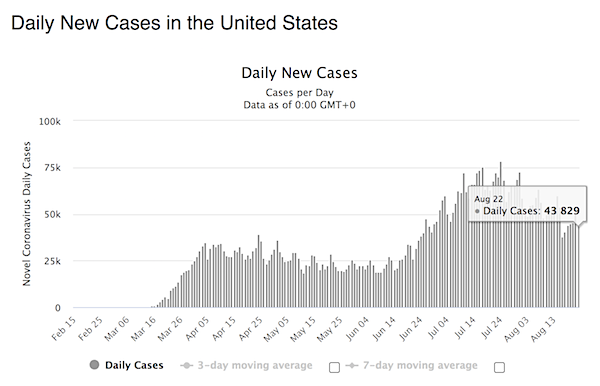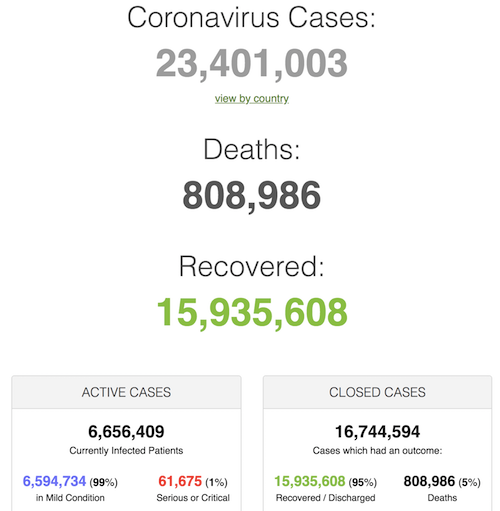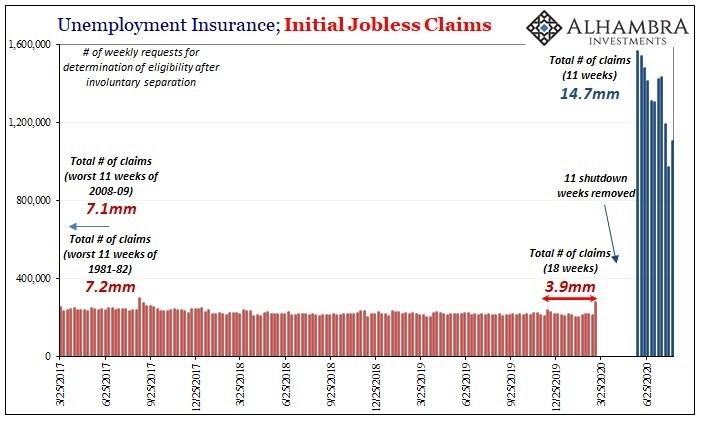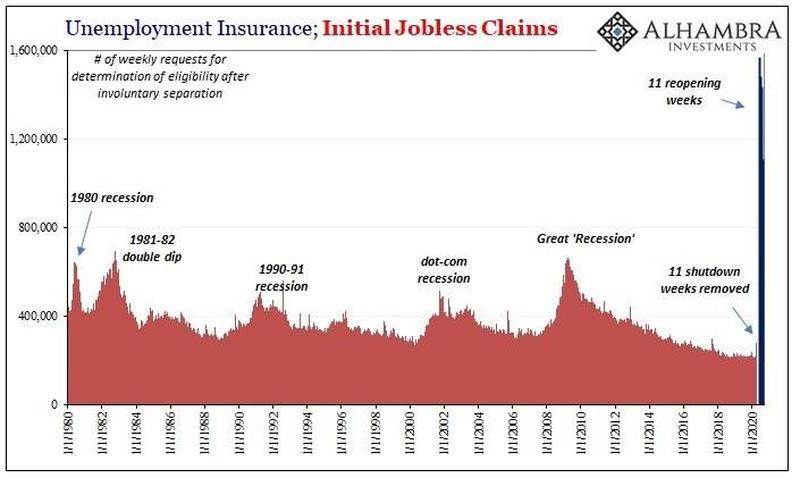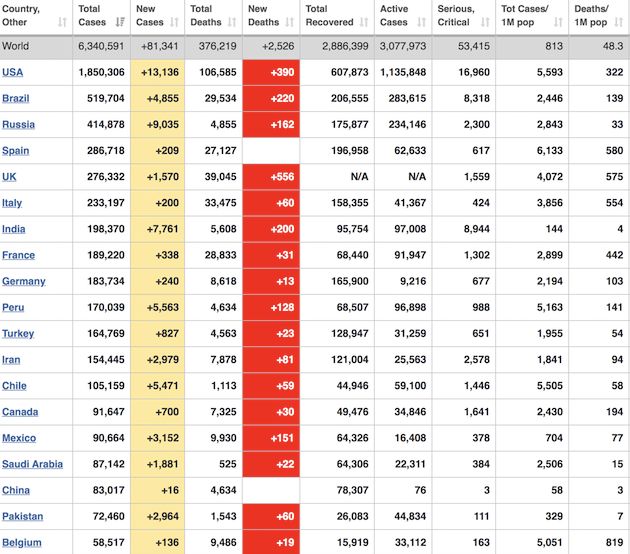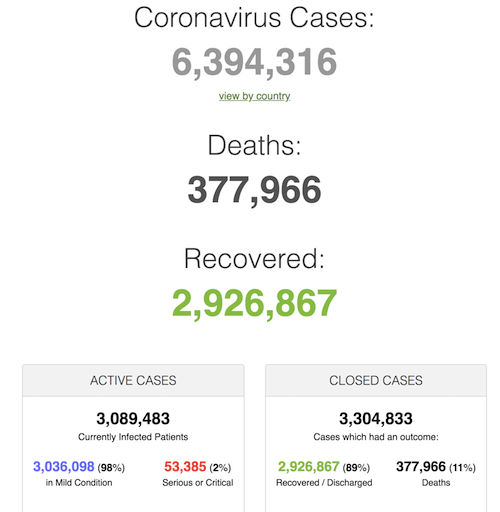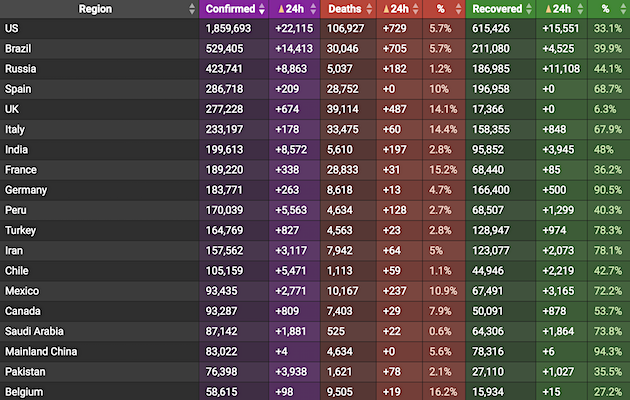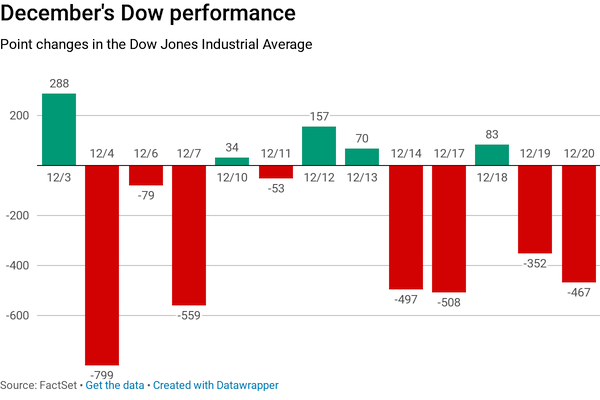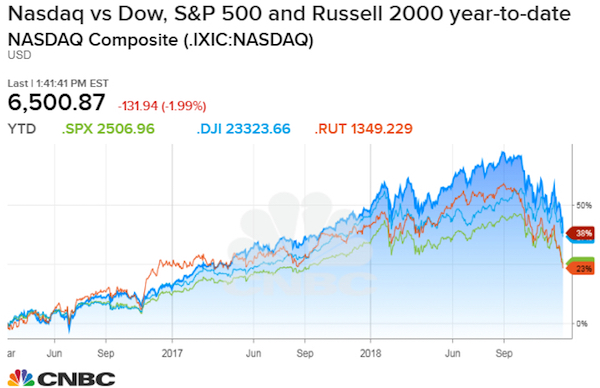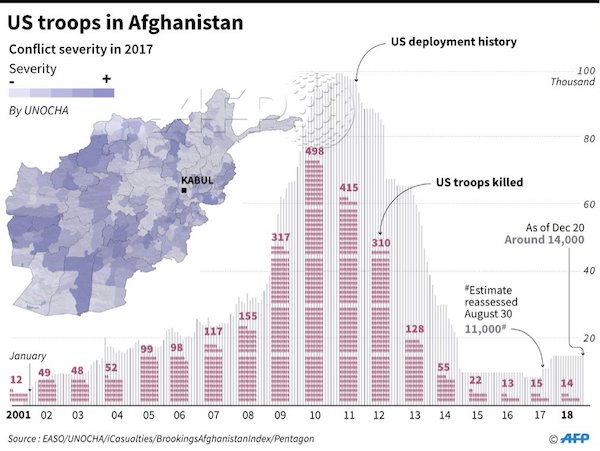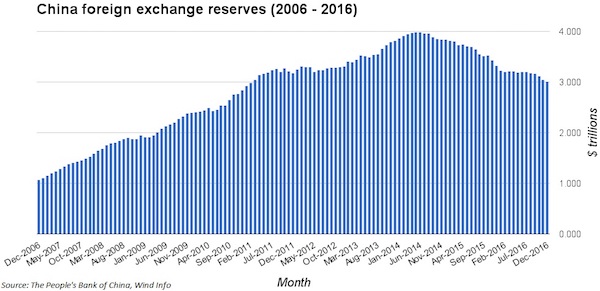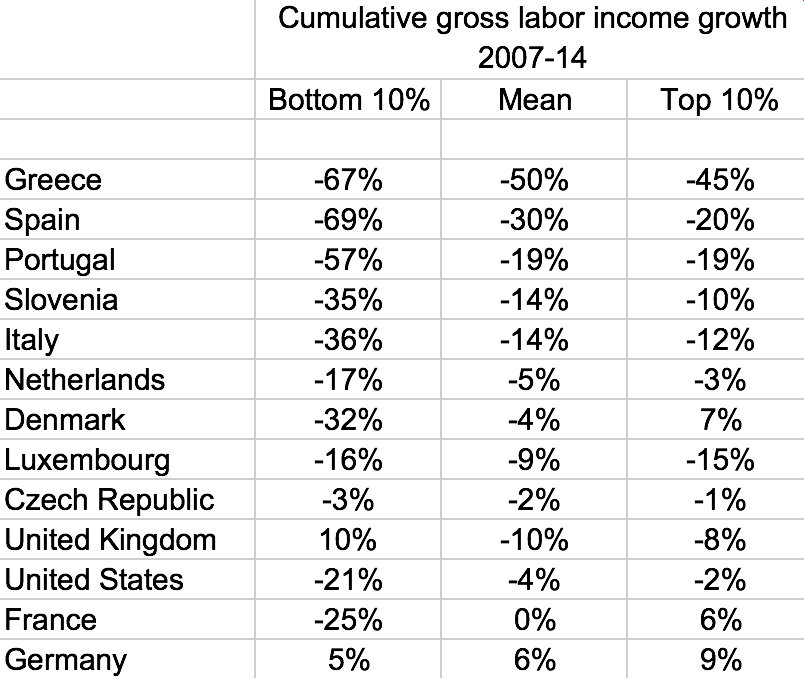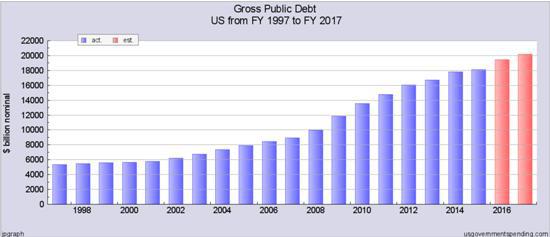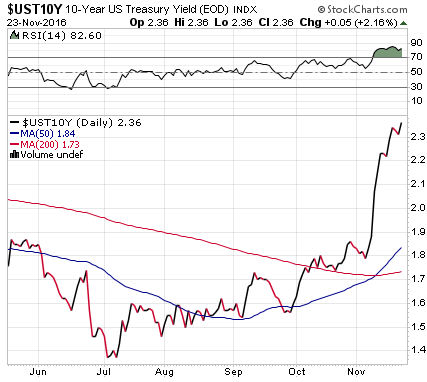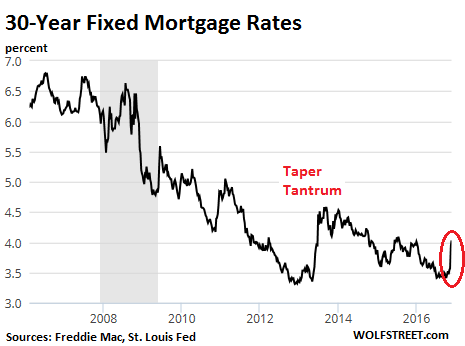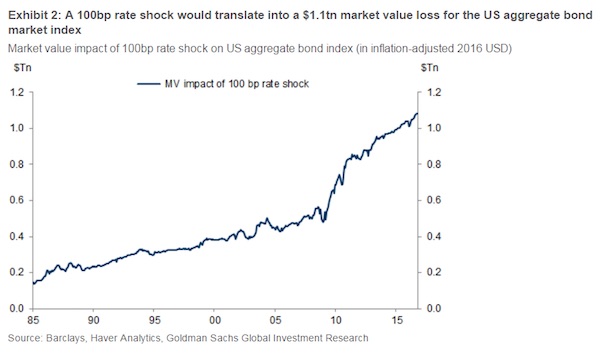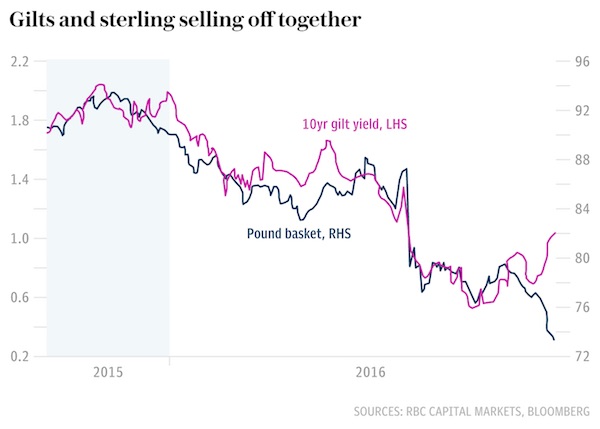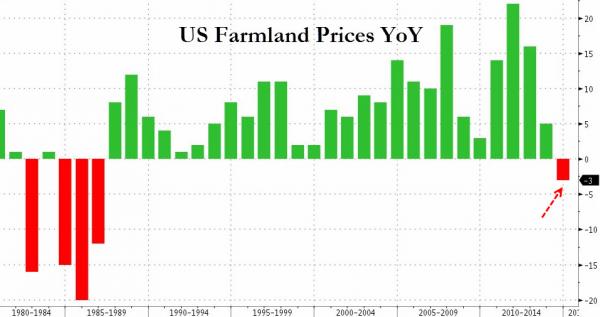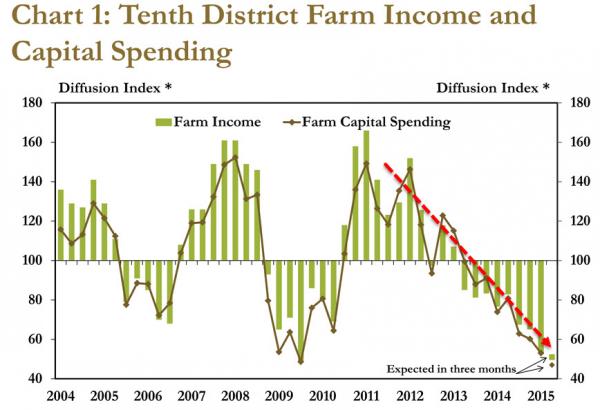
Paul Klee Limits of Reason (Grenzen des Verstandes ) 1927

The first lockdowns made sense, though too long; they were a response to a totally new virus. But policies should have been developed to make sure there would not be a second lockdown.
Such policies were not developed. Therefore, the second lockdowns merely disguise policy failures.
Days are getting shorter, nights are getting colder, and we’re locking down entire populations. The damage will be immense.

This looks funny at first. But at the end is no longer is. Biden copies Hillary word for word.
Tiptoe thru the tulips
This is Biden at his most perfect. You must watch to the end for your little Easter egg. pic.twitter.com/ViAGer8lsh
— James Woods (@RealJamesWoods) November 2, 2020
Tucker Trunalimunumaprzure
https://twitter.com/i/status/1323167019806695425

Sunetra Gupta is a professor of theoretical epidemiology at Oxford. She has to run to the Daily Mail to be heard. Like Glenn Greenwald has to go on Tucker Carlson, and Scott Atlas talks to RT.
We must not discuss either Hunter Biden or lockdowns.
• A Contagion Of Hatred And Hysteria (Sunetra Gupta)
Lockdown is a blunt, indiscriminate policy that forces the poorest and most vulnerable people to bear the brunt of the fight against coronavirus. As an infectious diseases epidemiologist, I believe there has to be a better way. That is why, earlier this month, with two other international scientists, I co-authored a proposal for an alternative approach — one that shields those most at risk while enabling the rest of the population to resume their ordinary lives to some extent. I expected debate and disagreement about our ideas, published as the Great Barrington Declaration. As a scientist, I would welcome that. After all, science progresses through its ideas and counter-ideas. But I was utterly unprepared for the onslaught of insults, personal criticism, intimidation and threats that met our proposal.
The level of vitriol and hostility, not just from members of the public online but from journalists and academics, has horrified me. I am not a politician. The hurly-burly of political life and being in the eye of the media do not appeal to me at all. I am first and foremost a scientist; one who is far more comfortable sitting in my office or laboratory than in front of a television camera. Of course, I do have deeply held political ideals — ones that I would describe as inherently Left-wing. I would not, it is fair to say, normally align myself with the Daily Mail. I have strong views about the distribution of wealth, about the importance of the Welfare State, about the need for publicly owned utilities and government investment in nationalised industries.
But Covid-19 is not a political phenomenon. It is a public health issue — indeed, it is one so serious that the response to it has already led to a humanitarian crisis. So I have been aghast to see a political rift open up, with outright abuse meted out to those who, like me, question the orthodoxy. At the heart of our proposal is the recognition that mass lockdowns cause enormous damage. We are already seeing how current lockdown policies are producing devastating effects on short and long-term public health. The results — to name just a few — include lower childhood vaccination rates, worsening cardiovascular disease outcomes, fewer cancer screenings and deteriorating mental health.
Such pitfalls of national lockdowns must not be ignored, especially when it is the working class and younger members of society who carry the heaviest burden. I was also deeply concerned that lockdowns only delay the inevitable spread of the virus. Indeed, we believe that a better way forward would be to target protective measures at specific vulnerable groups, such as the elderly in care homes. Of course, there will be challenges, such as where people are being cared for in their own multi-generational family homes. I am certainly not pretending I have all the answers, but these issues need to be discussed and thrashed out thoroughly.
That is why I have found it so frustrating how, in recent weeks, proponents of lockdown policies have seemed intent on shutting down debate rather than promoting reasoned discussion. It is perplexing to me that so many refuse even to consider the potential benefits of allowing non-vulnerable citizens, such as the young, to go about their lives and risk infection, when in doing so they would build up herd immunity and thereby protect the lives of vulnerable citizens. Yet rather than engage in serious, rational discussion with us, our critics have dismissed our ideas as ‘pixie dust’ and ‘wishful thinking’.

Scott Atlas can’t talk about lockdowns either other than on RT, “one of the Kremlin’s main propaganda platforms..” It’s safe to say that WaPo and CNN are propaganda platforms; RT, not so much.
• Trump COVID Adviser Atlas Forced To Apologize For RT Interview (RT)
Trump administration Covid-19 adviser Scott Atlas ripped public-health officials for “egregious” policy failures – only to be forced to apologize after mainstream media deflected his points by attacking him for appearing on RT. On Saturday, the Stanford University doctor, who has emerged as President Donald Trump’s top adviser on responses to the Covid-19 pandemic, called the lockdown policies an “epic failure” and argued they are “killing people,” while speaking with Afshin Rattansi on RT’s Going Underground show. “The public-health leadership have failed egregiously, and they’re killing people with their fear-inducing shutdown policies,” Atlas told RT.
“The lockdowns will go down as an epic failure of public policy by people who refuse to accept they were wrong – were wrong, refused to accept they were wrong, didn’t know the data, didn’t care. And it became a frenzy of stopping Covid-19 cases at all costs, and those costs are massive,” he said. “The argument is undeniable: The lockdowns are killing people.” Atlas then pointed to job losses, rising suicides, rising drug abuse and the harm being done to young people, tying the issues to the Covid-19 restrictions put in place. One study showed that 25 percent of Americans aged 18 to 24 thought about killing themselves in June “due to the lockdown”, he said.
“We’re creating a generation of neurotic children, forcing them to wear masks and be six feet apart from their friends, or not even have school in person.” While Atlas’ counter-narrative comments might have been fodder for a serious discussion of public-health policy, mainstream media outlets instead spun the interview into a controversy over a Trump administration official granting an interview to a Russian state-owned outlet. Reporters such as CNN’s Jim Acosta, Politico’s Ryan Lizza and NBC’s David Gura immediately pounced, ignoring the substance of his comments and breathlessly telling their followers that he spoke to an alleged Kremlin mouthpiece. “White House Covid adviser appears on outlet that is described by US intel as one of the Kremlin’s main propaganda platforms,” Washington Post national-security correspondent Greg Miller said.
ScottAtlas apology
I recently did an interview with RT and was unaware they are a registered foreign agent. I regret doing the interview and apologize for allowing myself to be taken advantage of. I especially apologize to the national security community who is working hard to defend us.
— Scott W. Atlas (@SWAtlasHoover) November 1, 2020

Days are gettig shorter, nights are getting colder, and we’re locking down entire populations. The damage will be immense.
• ‘Bleak Midwinter’ In Europe As 250 Million Face Lockdown (NZH)
More than a quarter of a billion Europeans are now in, or facing, fresh lockdowns after a second wave of Covid-19 deluged the continent. UK Prime Minister Boris Johnson grudgingly announced on the weekend that the 55 million residents of England would head into a four-week lockdown – even as some Brits headed off to Spain for autumn holidays. The UK nations of Wales and Northern Island are already in lockdown and Scotland has warned it may be forced to ramp up restrictions following the move in England. Britain joins a host of other nations, including France, Germany, Greece, Belgium, Ireland, Austria and the Czech Republic, in imposing new lockdowns.
It’s been dubbed the “bleak midwinter” as more than 250 million Europeans are now being told to stay at home for all of November. Other countries, such as Italy, Portugal and Spain, have imposed restrictions at a regional level and have warned they also may go into full lockdown mode. On Saturday, the UK PM said a four-week lockdown from November 5 was vital to avert a “medical and moral disaster” for the country’s health service, the NHS. He said deaths could reach “several thousand a day” and could peak above that of April’s lockdown. Johnson had previously vowed not to put England into a second lockdown, relying on regional restrictions to fight outbreaks. However, rising numbers – 22,000 new cases on Saturday alone – have pushed the UK into the one million coronavirus infections club.
[..] Statistically speaking, Belgium has been the European nation hardest hit by Covid-19 with more than 100 deaths per 100,000 population.From Monday, a strict lockdown will be accompanied by a curfew for up to six weeks. Belgium has been challenged by its small geographic size but highly devolved regional governments which has meant virus restrictions have varied, in some cases, from one town to another. Meanwhile in France, a cumulative 700km traffic jam choked the streets of the greater Paris region as residents streamed out of the city to spend a second lockdown in the country where many have second homes. Anyone leaving their home will have to fill out an “attestation” form declaring their reason for doing so.
[..] Despite the increasing number of lockdowns, a number of countries with lower infection rates are holding out against major restrictions. The Nordic nations of Norway, Denmark, Sweden and Finland are largely lockdown-free. Sweden, which has relied on voluntary guidance rather than legal enforcement, is seeing an increase in cases. But deaths remain low. The Government has asked residents of Stockholm and Gothenburg to avoid heading indoors to gyms and shops in an attempt to reduce infections.

“..we have gone beyond partisanship and into tribalism..”
• Bias In Journalism Has Become A Disease (Curtis)
Glenn Greenwald is the latest big-name journalist to quit a title, leaving the Intercept in a censorship row. This trend is indicative of a media landscape that reflects a polarized society which discourages freedom of thought. Imagine having to resign from something that you co-founded. It can’t be a good feeling. You spend all of your time trying to build it up into something tenable, only for things to fall apart. That’s the position Glenn Greenwald has found himself in at news website, the Intercept. But even more galling for Greenwald is why things turned ugly. As his resignation letter stated, “The Intercept’s editors, in violation of my contractual right of editorial freedom, censored an article I wrote this week, refusing to publish it unless I remove all sections critical of Democratic presidential candidate Joe Biden, the candidate vehemently supported by all New-York-based Intercept editors involved in this effort at suppression. The censored article, based on recently revealed emails and witness testimony, raised critical questions about Biden’s conduct.”
Working on the assumption that what Greenwald said is true, this is a distressing occurrence that’s becoming all too familiar. It’s reminiscent of Bari Weiss and her issues at the New York Times, Ariana Pekary leaving MSNBC, and Andrew Sullivan quitting the New Yorker. Over and over again, we’re seeing journalists who don’t want to adhere to certain partisan views being forced into a situation where they have to leave their publication because they won’t play the cheerleader. This is a worrying trend. Sure, partisanship has been part of journalism as long as it has existed. People will inevitably have biases towards certain belief systems that they adopt. With that said, there is another inevitability, given how flawed humanity is. And this is that flawed humans aren’t going to be able uphold the standards that people with those beliefs expect them to. In short, no one is perfect, and everyone is open to criticism.
However, what we are seeing from certain partisan forces is a desire for any and all criticism from journalists to simply be swept under the carpet. At that point, can it really be classed as journalism? Readers expect journalists to ask questions. Some of those questions are going to be tough; some may even constitute criticism. But those questions and criticisms can open the way to improvement. There’s nothing wrong with being a conservative and being critical of other conservatives, or being a liberal and being critical of other liberals. But when that criticism has to be silenced or is met with outright hostility, we have gone beyond partisanship and into tribalism. And that is not a positive development.

“This pollster is cool, the guy who got 2016 right, says “we take into account the fact that ppl may have one set of ideas n feelings in their local election and a complete different set of ideas n wishes in a national election.” He gets scale.”
• MI Nov 1, 2020 Presidential Poll (Trafalgar)
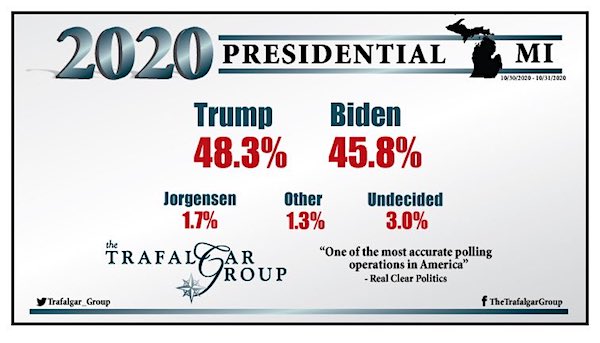
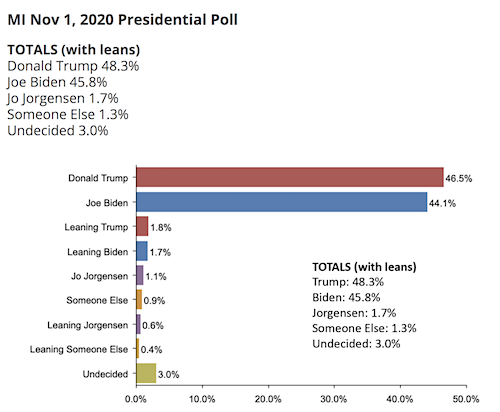
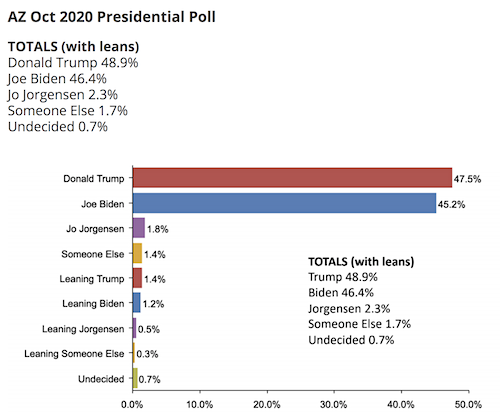
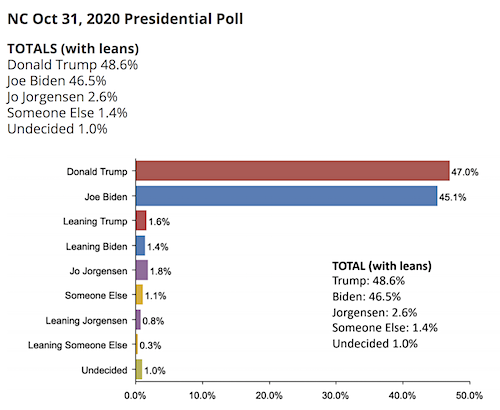
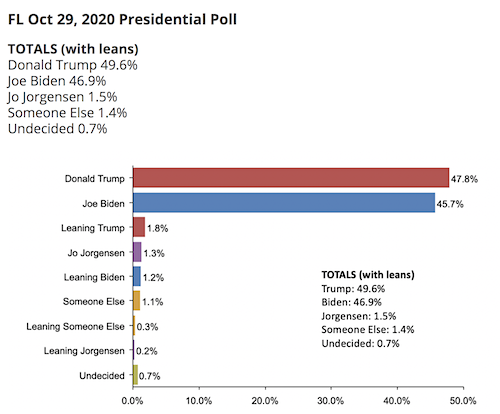

Cahaly

All the way to December 8?!
• The Complete Election Cheat Sheet: What Happens On And After November 3 (ZH)
It’s after midnight on Nov 3, the US population has voted, and the election results are popping up across the media landscape. When will we know who is the next president? Well, due to the special circumstances surrounding this election including a record number of mail in ballots and countless court challenges involving the voting process, we may have to wait…. a while. Below we lay out a timeline of key events and catalysts that everyone should be aware of. After Election Day on November 3, the results of the election need to generally be finalized by December 8, which is known as the Safe Harbor Day, as this is when states select their EC Voters.
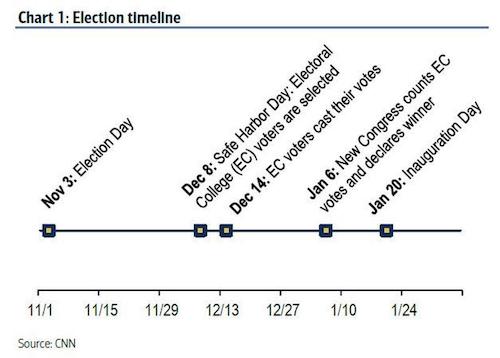
How to follow the news on Election Day. Here are a few tips from Bank of America: Here are a few tips:
• Be wary of exit polls: The track record of exit polls is tenuous at best. In 2004, exit polls showed John Kerry winning the popular vote by 51% to 48% only to ultimately lose by the same margin. Similarly, there were major flaws in the 2016 exit polls which substantially underestimated the number of white working-class voters while overestimating the number of college-educated white voters, leading to bias results favoring Hilary Clinton. Pollsters claim they have fixed the issues ailing Election Day polls but the better mouse trap is yet unproven. Moreover, there has been unprecedented surge in early voting (both in person and mail-in) with over 70mn votes cast nationwide to-date and there is a major skew in voter day preference by party. Admittedly, pollster are aware of this issue and will enhance their methodology by polling at large and early voting centers but nevertheless this creates greater uncertainty in their estimates.
• Brace for head fakes: Results from battleground states should begin to trickle in just after polls close within each state (Table 3). First battleground states to report will be Florida, Georgia and New Hampshire where polls close at 7pm EDT (polls in Florida’s panhandle will close at 8 pm), followed by North Carolina, Ohio and Michigan, Pennsylvania, Minnesota, and Wisconsin. Type of ballots reported first will vary across states. For example, according to reporting done by the Upshot blog of the New York Times, battleground states such as Florida, North Carolina, Ohio, Arizona, and Iowa will report early in-person and processed mail-in votes first. Meanwhile, Georgia, Michigan, Pennsylvania, Minnesota, Wisconsin, and Nevada will not follow any specific order. Getting a clear sense of who is winning will be difficult given the large number of early voting by mail and absentee ballots and different rules around processing ballots, which we discuss below.
• Key demographics: In 2016, President Trump was able to tip the election by winning the older and suburban vote. A post-mortem of the 2016 election by the Pew research center showed that Trump won the age groups 50-64 and 65+ by a margin of 6 and 9 points, respectively and edged out the suburban vote by 2 points. During the 2020 election cycle, polls have shown President Trump consistently running below his 2016 election numbers in these key demographic groups. In this context, keep an eye on results coming out of suburban areas such as Maricopa County in Arizona and Peach County in Georgia and older leaning regions such as Sumter County and Pinellas County in Florida. Results in these regions could prove to be a canary in the coalmine.
@TimMurtaugh
@TimMurtaugh on why the polling at Fox News is terrible and why we haven't ever given much thought to those polls.
Their pollster has been paid over $3million this cycle by DEMOCRATS who lost… in their party's primaries pic.twitter.com/LXDx5UsGLW
— Sam (@SunshineSt8Sam) November 1, 2020

The purpose of the Electoral Collage seems obvious. “..the Electoral College erects a constitutional check-and-balance to prevent corrupt urban politicians and voters from wielding disproportionate power..
• In Defense Of The Electoral College (AT)
In the last twenty years, Democrats have twice lost presidential elections when the Electoral College has “trumped” the popular vote, leading to Republican victories. First came George W. Bush’s presidential victory over Al Gore in 2000, then Trump’s shocker over Hillary Clinton in 2016. Thus, radical Democrats demand the abolition of the Electoral College. “It’s undemocratic,” they say. “The will of the people should rule,” they cry. Yes, it’s undemocratic, which, believe it or not, is an exceptionally good thing. That’s because the United States is not, and never has been a “democracy.” The word “democracy” is not in the Constitution. In fact, the founders hated pure, unrestrained democracies.
Instead, Article 4, Section 4, states that the Constitution provides a “Republican” form of government. Not a democracy. There’s a difference. “Democracy” equals mob rule, where angry, fist-shakers “vote” for or demand whatever they want. Imagine that, against the rights and interests of others. Think of the mobs burning Portland and Seattle. “Republic” equals freedom and the rule of law, featuring internal checks-and-balances against overconcentration of power. Remember that phrase, checks-and-balances. It’s key to understanding the Electoral College. That’s because the Electoral College erects a constitutional check-and-balance to prevent corrupt urban politicians and voters from wielding disproportionate power over the less powerful. In this case, that means rural and small-town America. Though the Constitution contains 7 Articles and 27 Amendments, two powerful concepts emerge as keys to understanding the Constitution.
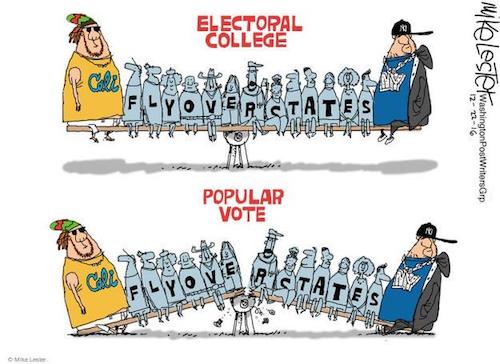
1. To Protect Freedom. First, the Constitution establishes government’s primary role, which is to protect individual freedom. The broadest freedoms designated for governmental protection are found at the Fifth and Fourteenth Amendments, guaranteeing Americans the right to life, liberty and property. Jefferson expresses a similar concept in the Declaration of Independence, discussing life, liberty and the pursuit of happiness. So, protecting freedom is the government’s principal role, not to become a giant lollypop factory dispensing free goodies as the Democrats advocate.
2. A Restraining Device Against Overconcentration of Power. Here’s the second concept: The Constitution is also a restraining device against over-concentrated governmental power. When lecturing on the Constitution, to illustrate a point, I often show a photograph of a drunk driver, just after being arrested by police officers, with handcuffs clamping his hands behind his back. Likewise, the Constitution handcuffs government on multiple levels, restraining excessive governmental power to protect citizens.
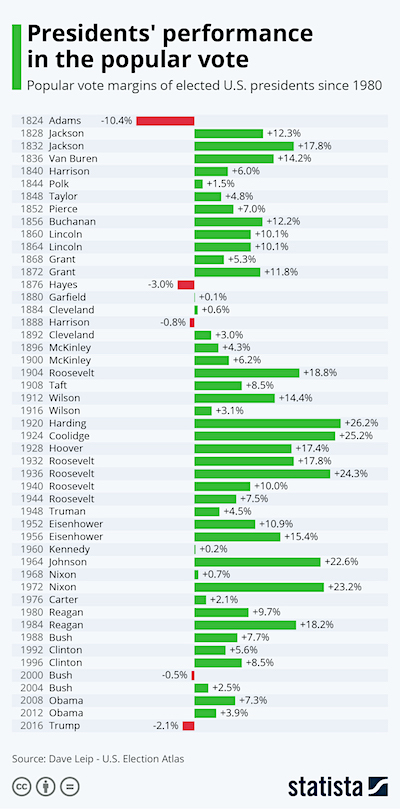
Tom Fitton
“Our new study shows 1.8M excess, or ‘ghost’ voters in 353 counties across 29 states. The data highlights the recklessness of mailing blindly ballots/ballot applications to voter registration lists," @TomFitton.
Watch more: https://t.co/PGoq56Vml4
Read at https://t.co/pj584AoaJV pic.twitter.com/cPfZbupNuP— Judicial Watch ⚖️ (@JudicialWatch) November 2, 2020

He listened to the scientists.
• Trump Failed To Fight And Expose The Establishment’s COVID Narrative (Marsden)
The best thing about the Trump presidency is arguably that every morning, no matter how bad a day you’re having, you can be assured that when you open your Twitter feed alongside your morning coffee, Trump will have said something that will make you shoot your Nescafe out your nose. (That is, if partisan hysteria hasn’t caused you to completely lose your sense of humor.) Modern-day US presidents haven’t exactly been the epitome of statesmanship, but unlike them, at least Trump gives you a chuckle. The problem with his approach is that while Trump is focused on wisecracks – however entertaining they can be – the Covid counter-narrative led by the usual suspects in the Washington establishment and their unelected (but often equally political) specialists and advisors, is one of doom and gloom.
They bombard the public with cherry-picked figures – like the transition to a preference for advancing numbers of ‘cases’ over deaths – and capitalize on Trump’s more fatalistic approach to portray him as incompetent at best and a willfully negligent maniac at worst. Governments around the world have been hard-pressed to prove that they’re doing something – anything – to control the Covid situation. Even if the effectiveness of government actions are still difficult to reliably assess or to separate from pre-existing endemic social and cultural factors that could account for variation in outcomes across or within nations. Yet the establishment is arrogantly and absolutely certain that they have all the answers vis-à-vis a phenomenon that is, by definition, so new that it’s called the ‘novel coronavirus’.
They vilify anyone who deviates from their views. We’ve seen this kind of establishment groupthink before. One example being the issue formerly known as “global warming” (now known as ‘climate change’, or, more recently, ‘climate deregulation’, because the issue was rebranded when it became difficult to explain how supposed ‘warming’ was causing colder weather). Any deviation from conventional establishment wisdom on this results in a pile-on and cancellation – just ask Mike Shellenberger. The same establishment hacks also persist with the simplistic narrative of good guys (America and its allies) versus bad guys (Russia and China, and their allies). This worldview is peddled every time they attempt to ramp up support for a natural resource grab or geopolitical power-play in some part of the world. Why should anyone trust their narrative when it comes to Covid? They’ve proven repeatedly that they’re anything but trustworthy and transparent.

“..he was treating the man who would be president like an invalid. ”
• Democrats Are Masking Biden’s Frailty (NYPost)
Has there been a worse candidate in history than Joe Biden? When this election is over, the books revealing what went on backstage will be illuminating. But the truth is there for anyone with eyes to see. Take Biden’s car rally in Flint, Mich., Saturday, with a star-power assist from Barack Obama. Awkward barely covers it. Obama, effortlessly cool, gave a warmup speech to the assembled cars before ramping up to a dramatic introduction: “My friend, the next president of the United States of America: Joe Biden!” Moments ticked by, but there was no sign of the candidate. “Joe Biden!” Obama repeated, a little less confidently. But still no show. Obama tried a third time: “Joe Biden!” Biden at last emerged from a nearby building and did a pantomime slow jog to the stage.
The worst part came later. After Biden had shouted his way through a short teleprompter speech, Obama came back onstage, perhaps to escort him off, because Biden did not seem to know where he was. Obama mimed an elbow pump with his former VP to signal they should leave the stage and then quietly whispered to him, after which it dawned on Biden he’d forgotten his mask, not for the first time. When your entire campaign is about mask-shaming Trump supporters, it’s not a forgivable lapse. Poor Biden looked like a chastened schoolboy as he fumbled through his folder and all his pockets looking for that pesky piece of cloth.
He walked back to the lectern and searched, to no avail, before fumbling through his pockets again. Finally, he found the mask in his left trouser pocket, held it aloft sheepishly at Obama, and placed it on his face. But then he paused and looked in seeming confusion at the microphone lying on the lectern where he’d left it. He picked it up and held it briefly to his masked face before laying it down again and rejoining Obama. Whatever emotions were going through Obama’s mind at that point he kept under wraps, but he did slow down and look back solicitously as he shepherded Biden down the stairs and away from prying eyes. In other words, he was treating the man who would be president like an invalid.
Really, it was sad.

Let’s do a 10-year study first.
• Add Vitamin D To Bread And Milk To Help Fight Covid, Urge Scientists (G.)
Scientists are calling for ministers to add vitamin D to common foods such as bread and milk to help the fight against Covid-19. Up to half the UK population has a vitamin D deficiency, and government guidance that people should take supplements is not working, according to a group convened by Dr Gareth Davies, a medical physics researcher. Low levels of vitamin D, which our bodies produce in response to strong sunlight, may lead to a greater risk of catching the coronavirus or suffering more severe effects of infection, according to some studies. Last week, researchers in Spain found that 82% of coronavirus patients out of 216 admitted to hospital had low vitamin D levels. The picture is mixed, however – some research shows that vitamin D levels have little or no effect on Covid-19, flu and other respiratory diseases.
Vitamin D deficiency can cause rickets in children and osteomalacia in adults – soft bones that lead to deformities – and children with severe vitamin D deficiency are prone to hypocalcaemia – low levels of calcium in the blood – which leads to seizures and heart failure. However, Public Health England (PHE) and the Department of Health and Social Care have rejected calls over the past 10 years to fortify foods such as milk, bread and orange juice, which is the practice in Finland, Sweden, Australia, the US and Canada. “In my opinion, it is clear that vitamin D could not only protect against disease severity but could also protect against infection,” Davies said. “Food fortification would need careful planning to be rolled out effectively, particularly as people are now taking supplements. Picking the right foods to fortify would need to be done carefully. “But it’s clear that the current policy is not working – at least half the population have a vitamin D deficiency.”

The White House on lockdown. And it’s not for COVID.
• Non-Scalable Fence Being Built to Protect Trump During Election Day Unrest (GP)
Federal agents are set to begin building a non-scalable fence around the White House, Ellipse and Lafayette Square and 250 National Guardsman have been placed on standby to protect President Donald Trump during any election day unrest. Major riots and destruction have been promised by leftist extremists should President Trump win reelection. “The White House on lockdown: A federal law enforcement source tells NBC that beginning tomorrow, crews will build a ‘non-scalable’ fence to secure the WH complex, Ellipse and Lafayette Square,” Geoff Bennett from NBC News tweeted. “250 National Guardsmen have been put on standby, reporting to Metro Police officials.”

We try to run the Automatic Earth on donations. Since ad revenue has collapsed, you are now not just a reader, but an integral part of the process that builds this site.
Click at the top of the sidebars for Paypal and Patreon donations. Thank you for your support.

Scary dog
https://twitter.com/i/status/1322949353472864256

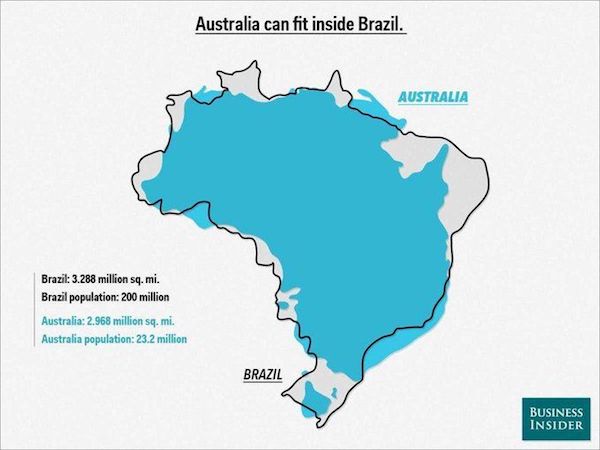

Support the Automatic Earth in virustime, election time, all the time. Click at the top of the sidebars to donate with Paypal and Patreon.




